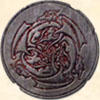Korobokuru
These demihumans live in villages throughout the Ama Basin and elsewhere; raising crops, fishing, hunting and trapping for a livelihood. Each village is independent of the others, though friendly ties are frequently maintained by neighboring ones.
In most villages, the korobokuru are led by a chief and two sub-chiefs, all elected by an assembly of the village elders. These three korobokuru declare laws, judge disputes, and decide punishments; but they are subject to the will of the populace, represented through the village elders. It is interesting that death is a punishment never awarded by korobokuru; indeed, they don’t even consider it to be one. Rather, criminals must suffer physical and psychological pain, which can include beating, maiming, and exile.
Heads of households, rather than shamans, conduct religious ceremonies. The korobokuru do have a variety of shaman, called a tusu, that is almost always female; her primary function is to be a channel through which the village chief can consult the spirit world.
Korobokuru are considered by most humans to be dirty, smelly, unkempt, and very hairy; and this is by and large the actual case. The females wear blue tattoos on their faces and hands; though others (especially southerners) often find these quite hideous, the korobokuru consider them marks of beauty. Korobokuru weave cloth from hemp nettles and certain types of bark; they sew clothing from this, as well as from furs, feathers and salmon skin. The lives of these little folk is difficult, and usually well occupied by trying to win life’s basic necessities. When they do have leisure time, they enjoy dancing, telling stories (in a manner of half singing, half chanting), playing some games, and drinking large amounts of crude beer or any other intoxicating drink available.
Korobokuru villages are found scattered thoughout the Ama Basin. In a couple of areas (noted on the map), the korobokuru are actually the predominant race, but this is unusual. In the western of the two regions there is actually a village, led by one Pekaonit, that might even be described as aggressive. But this is certainly an exception to the normal korobokuru lifestyle. The vast majority of these dwarves are peaceful and reclusive, preferring isolated and peaceful locales in which to make their homes.
The preferred weapons of korobokuru barbarians of the Northern Wastes are axe, club, knife, spring bow (a device equal to the light crossbow, used especially for deer hunting), and sword. Proficiencies they can commonly choose from are agriculture, bowyer, brewer, carpentry, chanting, dancing, fishing, pottery, small water craft, snare building, survival, tanning, tracking, weaponsmithing and weaving.
